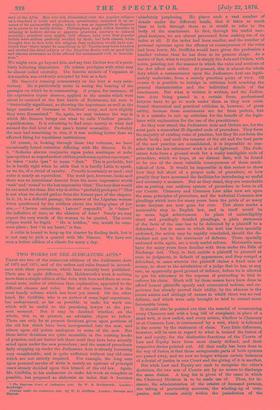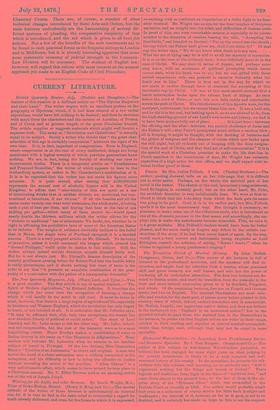TWO WORKS ON THE JUDICATURE ACTS.*
THESE are two of the numerous editions of the Judicature Acts of 1878 and 1875, and of the orders and rules framed in accord- ance with their provisions; which have recently been published. Their aim is quite different ; Mr. Holdsworth's work is nothing more than a simple edition of the Acts, with here and there an occa- sional note, rather of criticism than explanation, appended to the different clauses and rules. But at the same time, it is the most handy volume which has been yet issued. On the other hand, Mr. Griffiths, who is an author of some legal experience, has endeavoured, as far as possible, to make his work one which will be useful to the practising lawyer at the pre- sent moment. But it may be doubted whether, on the whole, this is, at present, an advisable object to follow. There can only be at present decisions given upon portions of the old law which have been incorporated into the new, and others upon old points analogous to some of the new. But these latter decisions are quite accessible in the existing books of practice, and are better left there until they have been actually acted upon under the new procedure ; and the mass of precedents daily cropping up under the Judicature Acts is already becoming very considerable, and is quite sufficient without any old cases which are not strictly required. For example, the long note upon personal service of writs is merely an epitome of principal cases already decided upon this branch of the old law. Again, Mr. Griffiths, in his endeavour to make his work as complete as possible, has prepared so elaborate an index that it becomes
• I% Supremo Court of Judicature Ads. By W. A. Holdsworth. London Rontledge.
Practice under the Judicature Ads. By W. D. Griffiths. Haynes.
absolutely perplexing. He places such a vast number of details under the different heads, that it takes as much time to look through them as it would to refer to the body of the enactments. In fact, through the useful mar- ginal analyses, we are almost prevented from making use of an index at all. If the index had been smaller, and the number of personal opinions upon the efficacy or consequences of the rules had been fewer, Mr. Griffiths would have given the profession a handier volume than he has done in its present shape. As a matter of fact, what is required is simply the Acts and Orders, with notes, pointing out the manner in which the rules and sections of the Act affect each other. At present, this is almost the whole duty which a commentator upon the Judicature Acts can legiti- mately undertake, from a merely practical point of view. Of course it is possible to indulge in criticism both touching the general characteristics and the individual details of the enactments. But what is written is written, and the Judica- ture Acts being passed in a certain form, professional lawyers have to go to work under them as they now exist. Sound theoretical and practical criticism is, however, of great utility, because these enactments are far from perfect., but it is a mistake to mix up criticism for the benefit of the legis- lator with explanation for the use of the practitioner.
As they now stand, the Judicature Acts and Orders are, for the most part, a somewhat ill-digested code of procedure. They form the majority of existing rules of practice, but they' to not form the whole body ; and until the remains of the old and the best parts of the new practice are consolidated, it is impossible to con- sider that the law reformers' work is at all lightened. The Judi- cature Acts form a ground-work for a really intelligible code of procedure, which we hope, at no distant date, will be found to be one of the most valuable consequences of these much- talked-of Acts. It would be impossible in this review to show how they fall short of a proper code of procedure, or how greatly they have increased the facilities for introducing so useful and necessary a measure. But as they stand, they are remarkable also as putting one uniform system of procedure in force in all our Courts. Chancery and Common Law alike now act upon the same principles of procedure, and the technical Common-law pleadings which have for many years been the pride of so many acute lawyers are now gone for ever. This alone marks a memorable step in English law, and in itself would be no mean legal achievement. In place of unintelligibly short and puzzlingly detailed pleadings, a plain statement of the facts of the case has to be delivered by a plaintiff to a defendant ; but in cases in which the writ has been specially endorsed, the action may be rapidly concluded, should the de- fendant not put in his statement of defence. These specially endorsed writs, again, are a truly useful reform. Mercantile men have for many years been familiar with them under the Bills of Exchange Act. They, in fact, enable a plaintiff to proceed at once to judgment, in default of appearance, and they compel a defendant, in cases wherein the plaintiff claims a fixed sum of money, to show to the satisfaction of a judge that he has, at any rate, an apparently good ground of defence, before he is allowed to put his adversary to the expense of proceeding to trial to enforce his claim. Much will by these means have been done to afford honest plaintiffs speedy and economical redress, and ex- perience has already proved their utility, by the absence in the recent assizes and sittings of causes in which there was no real defence, and which were only brought to trial to extract more favourable terms.
It should also be pointed out that the scandal of commencing every Chancery suit with a long bill of complaint, in place of a short writ, is now ended, and every action, whether in Chancery or at Common Law, is commenced by a writ, which is followed in due course by the statement of claim. Very little difference, however, will be seen in regard to what is termed the fusion of law and equity, for the distinctive functions of the Courts of Law and Equity have been most clearly defined, and their respective duties pointed out. All that really has been done in the way of fusion is that those antagonistic parts of both systems are passed away, and we now no longer witness certain instances of a denial of justice in one Court and the giving of it in another.
But while Law and Equity are each to recognise the other's doctrines, the two sets of Courts are by no means to discharge the same duties. A long list is given of the cases in which the Chancery Division is to be made use of. 'Thus, for in- stance, the administration of the estates of deceased persons, London : Stevens and the taking of partnership accounts, the winding-up of com- 'Allies, still remain solely within the jurisdiction of the
Chancery Courts. There are, of course, a number of other technical changes introduced by these Acts and Orders, but the main features undoubtedly are the harmonising of several dif- ferent systems of pleading, the comparative simplicity of that which is introduced, and the aid which is given to all bond fide suitors. Not a few of the benefits of the new enactments are to be found in such practical forms as the frequent sittings in London and in Middlesex, but it is already becoming apparent that some more systematic economy of judicial strength in the Common- Law Division will be necessary. The student of English law, however, will regard this reform with most interest as the nearest approach yet made to an English Code of Civil Procedure.































 Previous page
Previous page